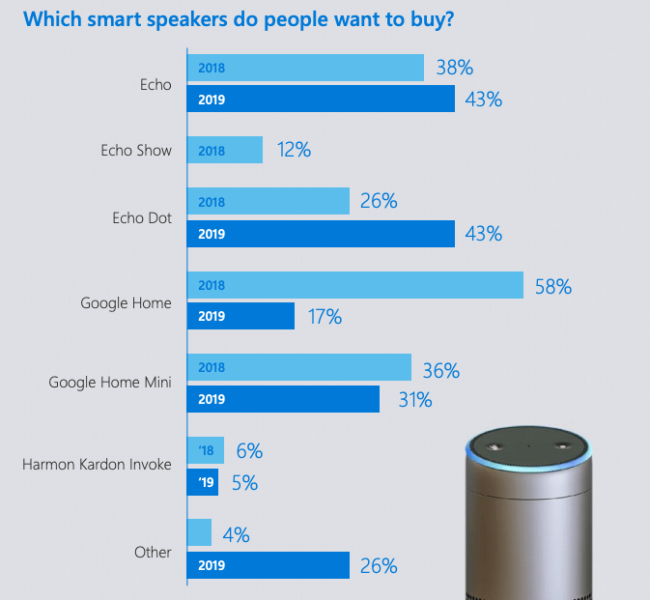Searching for facts, directions, local businesses are top digital assistant use cases, says survey
Smart speaker ownership jumped from 23 percent to 45 percent of respondents since last year's survey from Microsoft.
Nearly three-fourths (72 percent) of smartphone owners are using digital assistants, according to a new report from Microsoft. The findings are based on two surveys – one from mid-2018 that includes an international sample, and a 2019 follow-up involving 5,000 U.S. consumers. The study also found that 35 percent of the survey population had used “voice search” through a smart speaker.
Google and Apple tied for usage lead. In terms of usage market share, the report found Siri and Google Assistant tied at 36 percent, followed by Alexa (25 percent) and then Cortana (19 percent). The overwhelming majority of Cortana’s usage is on the desktop. These figures are not the same as device share. Google Assistant is available on more than a billion devices and Amazon dominates the smart speaker hardware market.
Top assistant use cases. Like many reports covering digital assistants, this one sometimes fails to make clear distinctions between smart speakers and smartphone usage. However, the report spends considerable time discussing smart speaker adoption and use cases.
In the context of that smart speaker discussion, Microsoft presents the following hierarchy of digital assistant usage:
- Searching for a quick fact — 68 percent
- Asking for directions — 65 percent
- Searching for a business — 47 percent
- Researching a product or service — 44 percent
- Making a shopping list — 39 percent
- Comparing products or services — 31 percent
- Adding items to a shopping cart — 26 percent
- Making a purchase — 25 percent
- Contacting customer service or support — 21 percent
- Providing feedback for a product/service — 19 percent
Some of the answers on this list (e.g., comparing products or services) suggest that respondents were commenting broadly about assistant usage – not just smart speakers. Indeed, the absence of responses such as “checking the weather” or “playing music” (answers common in other smart speaker surveys) suggests this as well.
The study found that 80 percent were “satisfied” with their digital assistant experiences (most likely on smart speakers this time), while 14 percent were “neutral” and only 6 percent were dissatisfied.
22 percent jump in ownership. In terms of smart speaker ownership, the 2018 survey discovered 23 percent of respondents had one. That number has jumped to 45 percent this year. Under the assumption that this is a U.S.-based population, that would mean roughly 112 million Americans today own at least one smart speaker, with an additional 26 percent saying they’re going to purchase one this year.
A very interesting finding surrounds brand-purchase intent. Amazon Echo has gained compared with 2018 and Google Home has lost share of intent to purchase. The number of people who said they want to buy a Google Home speaker declined from 58 percent in 2018 to 17 percent this year. It’s possible that the 58 percent bought Google Home devices, hence the drop. But the decline is noteworthy.
The Google Home Mini didn’t suffer the same decline in purchase intent. Finally, 26 percent of the audience said that they were interested in buying an alternative brand, which may include Sonos and the Apple HomePod, although that’s not clear from the report.
Digital assistant privacy concerns. A substantial minority (41 percent) of respondents said they had “concerns” about digital assistants — again, probably smart speakers here. Asked to elaborate, the top response was “that my personal information is not secure” (52 percent), followed by “that it is actively listening and/or recording me” (41 percent) and then “I don’t want my personal information or data used” (36 percent). These fears are not entirely unfounded, given recent revelations about Amazon employees listening to Alexa recordings — justified to improve voice recognition and understanding.
The surveys also asked about shopping using a digital assistant or smart speaker. Just over 41 percent said they had made a purchase through one or both channels (with 6.5 percent saying they didn’t enjoy it). The other roughly 59 percent had not made a purchase, with 27 percent in that group saying they that they were interesting making future purchases using assistants. More than half (54 percent) of respondents said they believed that digital assistants will help them make retail purchases within 5 years.
Why we should care. Both consumers and retailers expect smart speakers (and smartphone assistants) to become an important purchase channel in the next few years. The activities detailed in the list above argue that some search behaviors will transfer to voice channels over time.
There are clear implications for marketers, tied to voice optimization and other tactics. For example, if you’re a local service business there are specific things that must be done to appear in Google Home local listings. It’s also incumbent upon marketers to experiment with smart speakers to determine the most effective use cases for their brands and content.
Finally, certain shopping and commerce experiences may become common through smart speakers. Walmart’s updated voice grocery shopping experience represents a potentially successful voice-commerce model, involving list creation and reordering.
Contributing authors are invited to create content for Search Engine Land and are chosen for their expertise and contribution to the search community. Our contributors work under the oversight of the editorial staff and contributions are checked for quality and relevance to our readers. Search Engine Land is owned by Semrush. Contributor was not asked to make any direct or indirect mentions of Semrush. The opinions they express are their own.





